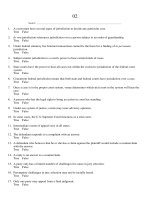- Trang chủ >>
- Thạc sĩ - Cao học >>
- Luật
Lecture Dynamic business law, the essentials (2/e) - Chapter 10: Capacity and legality
Bạn đang xem bản rút gọn của tài liệu. Xem và tải ngay bản đầy đủ của tài liệu tại đây (217.16 KB, 11 trang )
Chapter 10
Capacity and Legality
McGrawHill/Irwin
Copyright © 2013 by The McGrawHill Companies, Inc. All rights reserved.
Contractual Capacity
Definition: Mental ability to understand rights
and obligations established by contract, with
the presumptive ability to understand how to
comply with terms of agreement
102
Contractual Capacity
General Rule of Law: Natural persons over the
age of majority (18 in most states) are presumed
to have the full legal capacity to enter into binding
legal contracts
103
Individuals Who Have Only Limited
Capacity to Contract
• Minors
• Mentally Incapacitated Persons
• Intoxicated Persons
104
Rules Regarding Minor’s “Contractual Power of
Avoidance”
Disaffirmance (“Power of Avoidance”): Minors’ right, until
reasonable time after reaching age of majority, to disaffirm/avoid
their contracts
• To exercise right, minor need only demonstrate, through
words and/or actions, intent to rescind contract
• Minor must return any consideration received (if still in
minor’s possession/control), regardless of condition
• Even if consideration damaged/destroyed, other party has
no recourse against minor
• Rules designed to discourage competent parties from
entering into contracts with minors
105
Exceptions to Minor’s Right to Disaffirm
Contract
• Contract for Necessaries (Definition): Contracts
that supply minor with basic necessities of life
-Examples: food, clothing, shelter, basic medical
services
106
Exceptions to Minor’s Right to Disaffirm
Contract (Continued)
• Ratification (Definition): Acceptance of terms of
contract (entered into as a minor) after reaching
age of majority
-Express Ratification: Occurs when, after
reaching age of majority, individual states
(either orally or in writing) that he/she intends to
be bound by contract entered into while a minor
-Implied Ratification: Occurs when former minor
takes action after reaching age of majority
consistent with intent to ratify contract
107
Parental Liability for Minors’ Contracts,
Necessaries, and Torts
• General Rule: Parents not liable for contracts entered
into by their minor children
-Exception: Contracts for necessaries
• General Rule: Parents not liable for torts committed by
their minor children
-Exception: Failure to properly supervise child,
subjecting others to unreasonable risk of harm from
the child
108
Individuals Having No Capacity to
Contract
• Those adjudicated insane
• Those adjudicated habitually intoxicated
• Those with appointed legal guardians
109
Illegal Contracts
• Contracts with no legal purpose and/or subject matter
-Example: Agreement to commit crime/tort
• Contracts violating statute(s) and/or “public policy”
-Example: Usurious loan agreement (loan contract
exceeding state-imposed maximum interest rate)
-Example: Unconscionable contract (Agreement so
unfair that it is “void of conscience”)
1010
Effect of Illegal Agreement
General Rule: When an agreement is
illegal, the contract is void
1011









